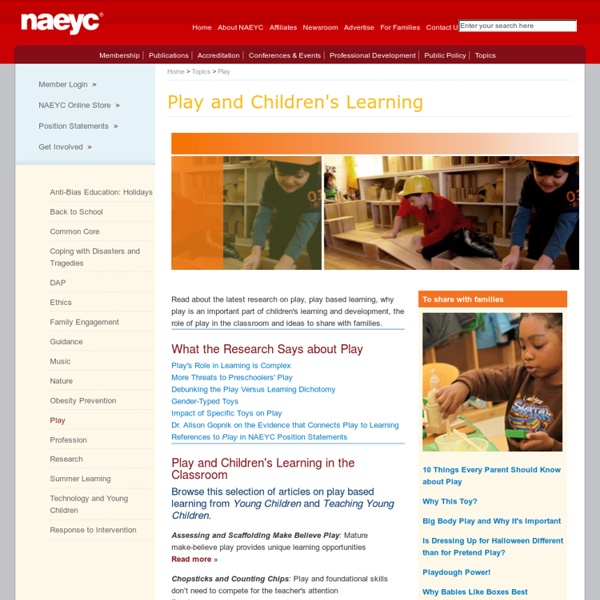Play and Children's Learning
Browse this selection of articles on play based learning from Young Children and Teaching Young Children. Assessing and Scaffolding Make Believe Play: Mature make-believe play provides unique learning opportunities Read more » Chopsticks and Counting Chips: Play and foundational skills don’t need to compete for the teacher's attention Read more » Playdough - What's Standard about It? Block Building and Make-Believe for Every Child: Encouraging boys and girls to try out the learning centers they don’t usually visit Read more » Block Off Time for Learning: When children play with blocks, they learn math, literacy, social skills and so much more Read more» Recess—It’s Indispensable: Test scores do not improve when recess is cut Read more » Why Do Babies Like Boxes Best?
Learning through play
Learning through play is a term used in education and psychology to describe how a child can learn to make sense of the world around them. Through play children can develop social and cognitive skills, mature emotionally, and gain the self-confidence required to engage in new experiences and environments.[1] Play[edit] Play must be pleasurable and enjoyable.Play must have no extrinsic goals; there is no prescribed learning that must occur.Play is spontaneous and voluntary.Play involves active engagement on the part of the player.Play involves an element of make-believe. Seven common characteristics of play are listed in Playing and Learning, by Beverlie Dietze and Diane Kashin: Play is active, child-initiated, process oriented, intrinsic, episodic, rule-governed, and symbolic.[3] Play and Work[edit] There are critical differences between play and work. According to Dietze and Kashin: Classical, modern and contemporary perspectives[edit] There are three main groups of play theories:[3]
let the children play
Play in NYC
play structure
To do with kids
Teacher resources
New York's Most Amazing Playgrounds - July 30, 2013
Playgrounds are a city kid’s backyard, and New York has had plenty of time to figure out what kids want. The first permanent playground structure was established in 1903 at Seward Park on Manhattan’s Lower East Side with the goal of moving children at play off the streets and out of the rivers (a thought that makes modern New York parents shudder). More than a century later, New York is in the midst of a playground revolution, with older playgrounds being renovated to better reflect current ideologies about how children play and newer playgrounds constructed with the twin goals of better stimulating young minds and bodies while also integrating seamlessly into the environment and ecosystem of the city. While the following amazing playgrounds are all open year-round, the summer season from Memorial Day to Labor Day is when water functions are turned on (remember to bring bathing suits). But truly the best feature of them all is that a visit to the parks doesn’t cost a thing.
Investigating Choice Time: Inquiry, Exploration, and Play | by: Renée Dinnerstein
History
Indoor & Outdoor Play for Kids in NYC | Time Out New York Kids
Best play spots for kids including New York playgrounds, NYC parks & botanical gardens for families, city carousels, play spaces, libraries & indoor activities. City carousels Jane's Carousel Jane’s Carousel, which opened in 2011 after 30 years of loving restoration, dazzles little ones and grown-ups alike. More info Friedsam Memorial Carousel Price band: 1/4 Crafted in 1908, Central Park's speedy carousel plays buoyant musical and is worth waiting in line for. Le Carrousel The Bryant Park small carousel pays homage to the green space's Parisian influence with French cabaret music. More info Prospect Park Carousel The hand-carved 1915 carousel's equestrian figures twirl to the tunes of a Wurlitzer organ. More info Pier 62 Carousel The waterfront merry-go-round features 33 hand-carved animals, most indigenous to Hudson River Valley. More info Forest Park Carousel The historic merry-go-round reopened under different management in May 2012. More info Flushing Meadows Carousel More info More info Central Park
About inquiry
Related:
Related:



